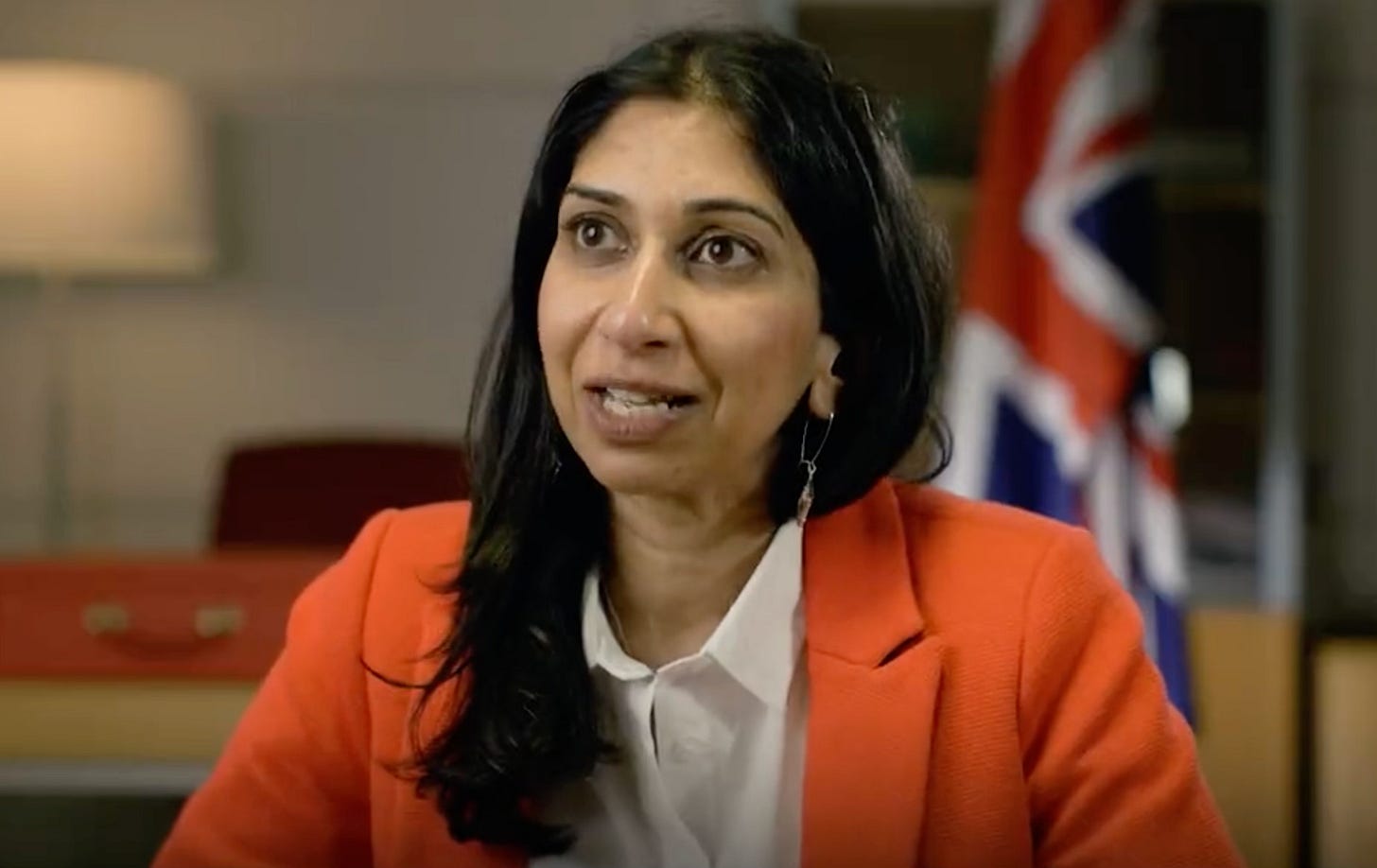Braverman in the firing line
What does the week ahead hold for Britain’s beleaguered home secretary?
Suella Braverman can look forward to an interesting week ahead.1
This afternoon, the home secretary will no doubt be questioned at length by MPs about the demonstrations we saw over the weekend. On Wednesday morning, she’ll learn whether she has won her appeal to the Supreme Court over the government’s Rwanda policy. Let’s consider those in turn.
Demonstrations
The balloon went up last Wednesday evening when The Times published a comment piece under Braverman’s by-line.
In it, she asserted that “right-wing and nationalist protesters who engage in aggression are rightly met with a stern response” from police officers while “football fans are even more vocal about the tough way they are policed”. Did she provoke Saturday’s violence? Or was she right to accuse the police of taking sides?
Interestingly, Braverman did not use her Times piece to argue the police should ban the march that Palestinian supporters were holding on Saturday. An hour or so before her piece appeared, the Telegraph published an analysis in which I said such decisions were best taken by the police.
Sir Mark Rowley, the Metropolitan Police commissioner, had concluded that the available intelligence on the pro-Palestinian march did not justify a ban. Given the existing law, that seems to have been the correct decision.
But Braverman’s point was a broader one:
It is the pro-Palestinian movement that has mobilised tens of thousands of angry demonstrators and marched them through London every weekend. From the start, these events have been problematic, not just because of violence around the fringes but because of the highly offensive content of chants, posters and stickers. This is not a time for naiveté. We have seen with our own eyes that terrorists have been valorised, Israel has been demonised as Nazis and Jews have been threatened with further massacres.
And that message was rightly endorsed on Friday by Melanie Phillips — in whom I declare an interest — writing on her Substack blog:
The demonisation of Braverman has exposed once again the deep moral sickness in Britain, already on display in these demonstrations. But she has spoken for millions of decent people (not including the thuggish Tommy Robinson, whose call to his followers to travel to London tomorrow to take on the marchers and by implication the police threatens to muddy the issue in violent confrontation) who understand that a civilised society does not defend the “right” of mobs to march through the streets calling for violent jihad and the death of Jews. A civilised society understands this to be a mortal threat to its deepest values, and fights it accordingly under the law.
It’s not clear whether the police were as astute to the risk of violent confrontation as Phillips was. Assistant Commissioner Matt Twist said on Saturday that “extreme violence from the right-wing protestors towards the police today was extraordinary and deeply concerning”, suggesting that Scotland Yard was taken by surprise.
Meanwhile, Sir Keir Starmer trod a careful path in yesterday’s Telegraph:
This weekend, we have again seen protests across our major cities. Among those protests are people we should have no truck with — those inciting violence, glorifying the terrorists of Hamas or calling for the destruction of Israel. They should be dealt with firmly by the law.
But those speaking up peacefully on behalf of the horrendous suffering of the people of Gaza are not somehow in breach of the spirit of remembrance — instead, they are exercising the very rights for which people have died for this country.
That distinction enabled him to criticise Braverman for characterising the weekly protests as “hate marches”. But there must surely come a point where well-meaning folk marching alongside those who, as Braverman put it, valorise terrorists, demonise Israel and threaten to massacre Jews must be taken to agree with protestors who were rightly condemned by Starmer for “inciting violence, glorifying the terrorists of Hamas or calling for the destruction of Israel”. How would the Labour leader have dealt with such fellow travellers if he had still been director of public prosecutions?
Phillips has collected some shocking incidents recorded on social media over the weekend. Braverman said yesterday that further action was necessary to deal with antisemitism and other forms of racism. “This can’t go on,” she added.
Today’s Times reports that Rishi Sunak wants the police to arrest, immediately, protesters seen using antisemitic slogans:
The prime minister is drawing up a five-point package allowing police to prohibit provocative chants as a condition of allowing protests, and to take into account the “cumulative effect” of weeks of marches in deciding on a ban.
That may be what’s needed. But rushed legislation is never a good idea.
Rwanda
Readers will recall that the deal with Rwanda was signed in the spring of last year by Dame Priti Patel. But Braverman has adopted it as her own.
As I explained in my preview of her appeal to the Supreme Court last month, the key question for the justices is whether a majority of the Court of Appeal had been right to “interfere with” an earlier decision by the High Court that Rwanda was a “safe third country” for people who had requested asylum in the UK.
Nobody watching the hearing could be sure what the court was going to decide — but some things about Wednesday’s ruling are already clear.
Keep reading with a 7-day free trial
Subscribe to A Lawyer Writes to keep reading this post and get 7 days of free access to the full post archives.





